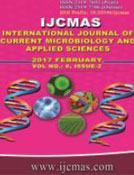


 National Academy of Agricultural Sciences (NAAS)
National Academy of Agricultural Sciences (NAAS)

|
PRINT ISSN : 2319-7692
Online ISSN : 2319-7706 Issues : 12 per year Publisher : Excellent Publishers Email : editorijcmas@gmail.com / submit@ijcmas.com Editor-in-chief: Dr.M.Prakash Index Copernicus ICV 2018: 95.39 NAAS RATING 2020: 5.38 |
Enterococci have emerged as an increasingly important cause of nosocomial infections in patients with cancer. The emergence of vancomycin-resistant enterococci (VRE) is a cause of concern, as once established, it is very difficult to control. A study on the characterization and antimicrobial susceptibility pattern of clinical isolates of enterococci from patients with cancer was carried out in the Division of Microbiology, Regional Cancer Centre, and Thiruvananthapuram for a period of three months. A total 100 enterococcal isolates obtained from various clinical samples were included in the study. E. faecium (73%) was the predominant enterococcal species isolated in the study followed by E. faecalis (24%) and E. durans (3%). 18 strains (18%) of the enterococcal strains were resistant to vancomycin. Resistant strains had an MIC ranging from 32 µg/ml to 512 µg/ml for vancomycin. All strains were susceptible to linezolid and tigecycline. Vancomycin resistance was observed in a significant percentage of enterococcal isolates. Tigecycline or linezolid should be considered in empirical treatment of presumed enterococcal sepsis. Stringent infection prevention and restricted use of vancomycin are important measures to reduce the prevalence of emergence of resistant enterococci.
 |
 |
 |
 |
 |